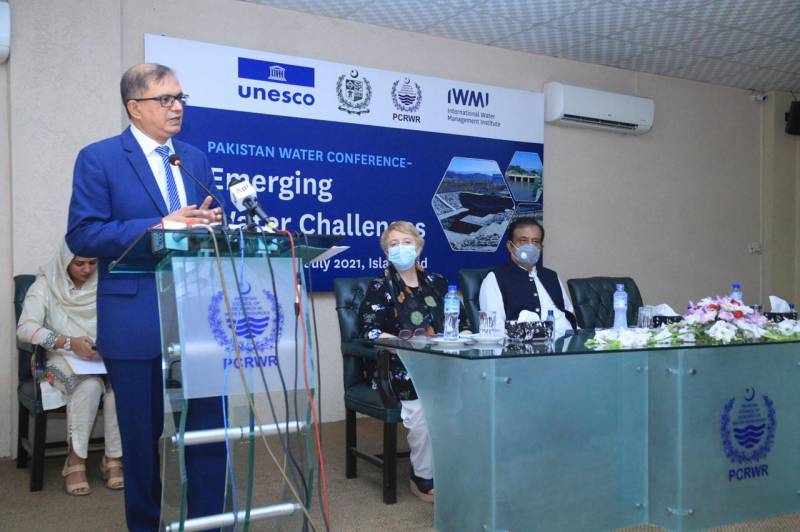Experts ponder solutions to solve water challenges in Pakistan

Stay tuned with 24 News HD Android App

A high-profile panel of officials and experts have brainstormed ideas to improve water governance in Pakistan, stressing the need for collaborative efforts aided by technology to tackle the existing and upcoming challenges.
The water advocates, including Minister for Science and Technology Shibli Faraz, shared their views in the ‘Pakistan Water Conference on Emerging Water Challenges’ held by the Pakistan Council of Research in Water Resources (PCRWR) in collaboration with the International Water Management Institute (IWMI) and UNESCO Pakistan on Tuesday.
Shibli Faraz highlighted his vision to help solve the water crisis in the South Asian country. The minister apprised the audience of the importance of the matter and shared that the issue under discussion was close to his heart.
"The climate change has placed Pakistan on the list of vulnerable countries," the minister shared while admitting that Pakistan was facing water scarcity.
The lawmaker was of the view that thousands of children die of water-borne diseases, highlighting that water was crucial for socio-economic development. The minister announced that a smart metering system was being launched as a pilot project.
"Integrated water management data warehouse is missing," he shared while focusing on the need for research-informed policy.
Faraz also lavished praise on International Water Management Institute (IWMI) for collaborations as well as organising the conferences in this regard.
"I assumed the office with a single point agenda of transforming research into public benefit," the minister asserted while assuring unwavering support in this regard.
Ms Patricia Mc’Phillips, UNESCO Country Representative, said that once a water abundant country, Pakistan has now become a water-stressed country. UNESCO, in collaboration with PCRWR, has taken several initiatives on a pilot scale. However, to achieve SDG Goal 6 immense efforts are required amidst the emerging issues of climate change and unregulated exploitation of groundwater.
On the occasion, the country representative of the International Water Management Institute (IWMI), Dr Mohsin Hafeez highlighted the initiatives taken by IWMI to help boost water productivity.
"We are relying on scientific knowledge and evidence-based policymaking for improving water governance in the country," he asserted. Dr Hafeez further informed the audience that a groundwater management project was being launched in the Punjab capital, Lahore.
The water expert also shared insights on burgeoning environmental challenges as well as the opportunities available to the country.
"Horizontal as well as vertical collaboration is required to address water challenges," said the expert while adding that data plays a critical role in finding the solution.
Shedding light on the projects developed by IWMI in collaboration with international donors, Dr Hafeez shared that Telemetry systems were being installed for better water management.
"With proper monitoring mechanisms, we now have data available on Khyber Pakhtunkhwa water share that can assist in resolving disputes as well," he affirmed.
The top expert on water also highlighted the latest techniques including artificial recharging, rainwater harvesting and intensive groundwater modelling as being decisive to mitigating water crisis. Reiterating the importance of agriculture for economic output, Dr Hafeez affirmed that a coherent national policy focusing on the capacity building of relevant institutions is the need of the hour.
Earlier, in his welcome address, Dr Ashraf, Chairman Pakistan Council of Research in Water Resources (PCRWR), highlighted the importance accorded to water issues by the Minister for Science and Technology. He shared that the feedback of the national conference would be presented to the international audience and a ‘water week’ was being deliberated upon to raise awareness about the issue and put forward suggestions in this regard.

Highlighting the initiatives taken by PCRWR, the expert outlined the MoU signed with Capital Development Authority (CDA).
"The solution to the problems of water in Islamabad lies in the same city," said Dr Ashraf. He shared that CDA has agreed to install wells to recharge depleting water resources.
The PCRWR chief then shared with the audience that CDA would be assisted in water resources management, regulatory framework as well as recycling and treatment of wastewater; the official shared that a sector of the capital city has been taken up as a test case.
The participants of the conference were addressed by top professionals from the water sector, who shared their experiences to help face the looming water crisis.
The conference was attended by professionals and researchers from national and international organizations. Mr. Nadeem Irshad Kiyani, Secretary, Ministry of Science and Technology concluded the conference.
